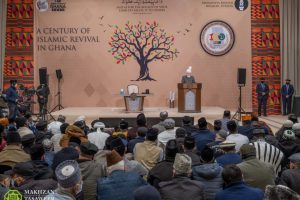After reciting Tashahhud, Ta‘awwuz and Surah al-Fatihah, His Holiness, Hazrat Mirza Masroor Ahmad (aba) said that these days, in the name of enlightenment, and freedom, such views have come about which are far from being enlightened and lead one to darkness.

Opening Spiritual Eyes in a Time of Worldliness
His Holiness (aba) said that the so-called freedom which is touted these days is actually leading to ruin. What some fail to realise is that in the name of such enlightenment and so-called freedom is leading our future generations on a path of ruin. When worldly people try to save themselves from an evil, they fall into another evil, for their spiritual eyes are closed. Worldliness has led people so far away from religion, that people do not even wish to open their spiritual eyes. Islam is especially looked down upon, and it is said that Islam has no bearing. However, it is Islam which gives the teaching of fulfilling everyone’s rights. It grants freedoms, while highlighting the boundaries of others, and provides teachings of how to implement them.
Does Islam Give Rights to Women?
His Holiness (aba) said that generally, it is alleged that Islam does not grant freedom to women. However, this allegation is raised only due to a lack of knowledge, or simply for the sake of levelling an allegation. Islam teaches that if a peaceful society is sought, then everyone’s rights must be given and everyone must play their role and duty. Islam does not merely tell women to obtain their rights but also teaches them to understand their rank and to abstain from evil.
His Holiness (aba) said that God has given various teachings regarding women, and the practical example of how to honour women was set perfectly by the Holy Prophet (sa). Then, in this age, the Promised Messiah (as) showed us how women should be honoured and respected, and these teachings have been reiterated by his successors. When all of these teachings are present, one should not think that Islam has not established the rights of women.
His Holiness (aba) said that the right of women highlighted by Islam have not been mentioned in any other spiritual or worldly law. His Holiness (aba) said that the rights given to women by Islam are also made clear through the verses of the Holy Qur’an that are recited at the time of Nikah (Islamic marriage announcement). It is stated in the Holy Qur’an:
‘He it is Who has created you from a single soul, and made therefrom its mate, that he might find comfort in her. And when he knows her, she bears a light burden, and goes about with it. And when she grows heavy, they both pray to Allah, their Lord, saying: “If Thou give us a good child, we will surely be of the thankful.”’(7:190)
His Holiness (aba) said that this shows, from the very outset of a marriage, it has been made clear that men and women are equal, and they have been created from a single soul, and thus both possess similar qualities.
His Holiness (aba) said that the same equality was established by the Holy Prophet (sa). In fact, the Holy Prophet (sa) said that women should be consulted in various matters as well. Once when a woman spoke up in a matter and was silenced, she said that the days of silencing women were over, for the Holy Prophet (sa) himself said that women should be consulted in certain matters. Thus, even women felt that the Holy Prophet (sa) was granting them their due rights.
His Holiness (aba) said that we must realise that these rights have been afforded by Islam, and we should not be deterred by the various movements that come about in the world in the name of freedom and liberation. We should tell them that as far as rights are concerned, they have been granted by Islam, but the so-called freedoms which they seek, in fact diminish the rights of women. Many columnists have written that the cries for freedom these days are not for the sake of women, but are made out of personal interest.
Marriage in Islam
His Holiness (aba) quoted the Promised Messiah (as) who said that rights given to women by Islam have not been given to them anywhere else. The relationship of a husband and wife should be like two friends. The first witness of a man’s moral conduct is his wife. Furthermore, Islam teaches that the best among you is the one who is best to his family. If one cannot reconcile with his wife, then he cannot reconcile with God.
His Holiness (aba) said that a true friendship is a strong bond between two people. Hence, the same relationship should be established between a husband and a wife. This, however, must be established after marriage. In today’s society, a man and a woman establish a friendship beforehand and then get married. However, data shows that such marriages have a higher percentage of breaking down. In Islam, one marries under the shade and for the pleasure of God.
His Holiness (aba) said that at the same time, this does not mean that parents should force their children to marry. There are some who dictate exactly who their children should marry, based on their own preference or caste. This is wrong, and the parents’ role should be to pray and present their suggestions. Islam has categorically stated that forced marriage is prohibited.
Rights Owed to One’s Family
His Holiness (aba) said that many domestic issues arise when men do not honour their wives and give them their due rights. This is why Islam teaches that the best among you is the one who is best to their family.
His Holiness (aba) said that there are instances where after marriage, the married couple lives with the husband’s parents. At times there can be issues between the wife and her in-laws. Therefore, women have the right to want a separate home, and this should be honoured by men where the circumstances allow. Similarly, women are given a dowry at the time of marriage. Women have also been granted a share of the inheritance, something which even in the Western world was unheard of until recently.
His Holiness (aba) said that Islam also encourages the education of women. It is said that if a person has two daughters and educates them, then this is enough for that person’s sins to be forgiven and to enter into heaven. Therefore, women should be encouraged to attain higher education. At the same time, they must be mindful of their responsibilities of tending to the future generations. This is why Islam teaches that paradise lies under the feet of mothers. This distinction has been given to women, not men. Hence, women can in fact far excel men if they so wish.
Treating Women With Justice
His Holiness (aba) said that Islam also grants the right of divorce, a right which has been given to both men and women equally. Men have been instructed that in such circumstances, they must not act unjustly towards women. The Promised Messiah (as) states that God knows everything; if in the case of separation, if the woman has been treated unjustly and prays against her husband, then that prayer is heard by God. Thus, men are being warned to be mindful of the manner in which they treat their wives.
His Holiness (aba) said that another allegation is raised that by allowing men to have more than one wife, the rights of women have not been tended to. However, it must be understood that having more than one wife is only under certain circumstances. This permission is not at all for a person to merely satiate their desires. In fact, if we look at modern society, having more than one partner has become common. Hence, it must be understood that having more than one wife is under very strict and certain circumstances, the primary one being justice. The Promised Messiah (as) said that if one truly understood the degree to which Islam had enjoined men to be just to their wives, then perhaps men may not even marry one wife, out of fear of not being able to fulfil these conditions. Furthermore, Islam teaches that if all the conditions for a second marriage are present, but one knows that the first wife will be displeased by it, then one should not marry another wife. Even at the time of marriage, a woman can take an oath from her husband that he will never marry another wife.
His Holiness (aba) said that it is the responsibility of men to ensure that all the needs of their wives are met. In fact, even if the wife is working and earning, the man should not so much as glance at her wealth. Men should never cause any sort of harm to their wives and should care for them in all respects. Hence, the rights of women have been firmly established, and men have been made aware of their responsibilities.

Can Women Attain the Same Spiritual Rank as Men?
His Holiness (aba) said that once a woman went to the Holy Prophet (sa) and said that men are able to go out for Jihad and listed various other things as well. However, women remain at home and tend to the household and children. When this is the case, can women attain the same spiritual rank as men? This question greatly pleased the Holy Prophet (sa) who expressed how impressed he was with the manner in which she had presented the matter and her profound thinking. The Holy Prophet (sa) told his companions sitting with him that they must honour women. The Holy Prophet (sa) told her that as for the matter which she presented, men and women are equal. Therefore, Islam teaches that men are guardians only in terms of the responsibilities that they hold, otherwise when it comes to rank, both men and women are equal.
His Holiness (aba) said that Islam also teaches to observe purdah (the veil). It should be remembered that where women are enjoined to observe the veil, men are commanded first, to act modestly and lower their gaze. The purpose of the veil is not to restrict women, rather it is to protect men and women from faltering. Thus, when some say that not all men stare at women, they should understand that this is not the only purport of the veil, rather it is to protect everyone. Furthermore, undue restrictions should not be imposed in the matter of the veil. The Promised Messiah (as) stated that the veil does not mean that women feel restricted in what they can do, or feel restricted to their homes. In fact, women can certainly leave the home and go out into society, all while observing the veil and modesty. Islam seeks to establish righteousness, and the veil achieves this.
His Holiness (aba) prayed that may we always tread the path of righteousness. Every Muslim woman and girl should understand her rank in light of the teachings of Islam, the Holy Prophet (sa), rather than following those worldly people who blindly declare freedom. In fact, it is the responsibility of every Ahmadi woman and girl to show the world the true rank of women, without any feeling of inferiority.
Summary prepared by The Review of Religions.




Add Comment